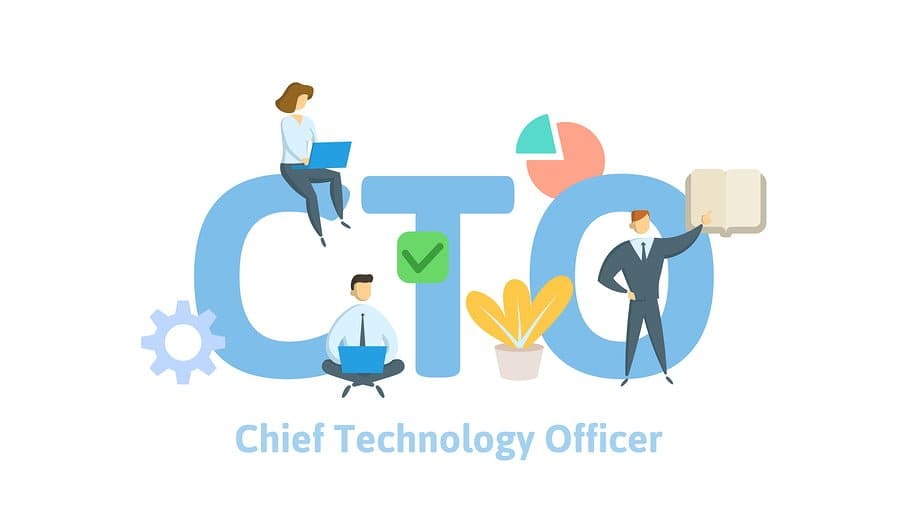The chief technology officer (CTO) is the executive responsible for an organization’s technological needs. But, as technology continues to evolve, so too does the role of those in charge of supervising it.
Table of Contents
ToggleToday, with technology being such an intrinsic part of a company’s success or failure, chief technology officers have had to become innovators, risk-takers and true business leaders. To be profitable, chief technology officers working today are responsible for balancing technology development and market demands for a sustainable competitive advantage. They are also often the leader of the research and development for the technological goods the company produces, and are responsible for developing, implementing, managing and evaluating the company’s technological resources.
What’s more, as digital transformation continues to become imperative to ongoing business strategies, chief technology officers are finding that they are becoming responsible for more than just technology. They are responsible for – or at least heavily involved with – overseeing the transformation of every business process, and are expected to apply technology into every facet of the business.
In years gone by, CTOs would be able to work pretty much entirely within their own department. Now, however, it is becoming increasingly important for chief technology officers to not only be aware of, but actively participate in all aspects of the company. They are expected to take a leading role in company growth and transformation processes.
It’s an incredibly important role in today’s technology-focused business landscape. So, what are the qualities chief technology officers need to possess to drive their organizations forward in an ever-changing market? Let’s consider five of the most important.
- CTOs Must Be Visionary and Driven to Achieve Market Success
Chief technology officers must be more than just technically savvy. They need to be strategic, analytical, forward-looking, and constantly alert to new trends that will drive their company forward.
CTOs need to be visionaries. They must have a clear idea where the company will be in X months’ time, and what technologies the business will require to reach that future state. In order to keep their organizations competitive, efficient and scalable, chief technology officers must continuously monitor and assess the rapidly-changing world of technology. They need to be analyzing market trends, keeping a close eye on the successes and failures of competitors, and anticipating consumer demand in the long-term and preparing for it.
For example, it’s no secret that the emergence of automation and artificial intelligence is dramatically influencing consumer behavior and market trends. As such, modern CTOs need to ensure their teams are quick to gauge and adopt such technologies if they’re what the market is demanding, and thereby make sure the company is able to remain relevant and competitive, or even blaze the trail ahead.
- Communication Skills
A good chief technology officer must be able to explain technical concepts to non-technical people within the organization, including the CEO and other board members, as well as employees across departments.
As new technologies are identified that the chief technology officer considers will be a boon for the business, he/she must then be able to communicate the benefits effectively to different audiences. CTOs must be able to communicate technical information to business personnel, and business information to technical personnel. This involves having a true understanding of not only the technology in question, but also the audience, and having the diplomacy and patience to convey complex subjects in terms that all stakeholders can understand.
This ability to translate something technical into something business-relatable is a key skill for modern chief technology officers, and something that Greg Hanson, CTO & VP at Informatica, knows the value of first-hand. As he explains to Information Age: “One of my strengths and skills was always the ability to translate a business initiative or a business imperative into a requirement for how we should develop software solutions. This stood me in great stead – the ability to translate business requirements and initiatives into products and projects that helped to meet those business requirements.”
- CTOs Must Be Entrepreneurial
Being able to work to achieve high-level business goals is a vital skill for every member of the C-suite – the CTO included. Not only will a good chief technology officer help the business stay nimble and competitive in the short-to-medium-term, but will have in-depth knowledge of the organization’s wider objectives, and use that knowledge to address how technology can best serve the organization’s goals over the long-term as well.
Rather than getting lost in small everyday tasks, the CTO must see the big picture of what the organization is moving towards. Chief technology officers must focus their time evaluating how technology can be used to create new business models and lines. They must be looking to disrupt markets, and, as such, have disruptive ideas. In short, good CTOs are entrepreneurial – they are business-minded “big thinkers” that champion innovation.
- CTOs Must Be Evangelistic Product Experts
A great chief technology officer will have a sound understanding of development, and know how to transform business ideas into a real working product. They will be able to recognize early on if business goals and product development are drifting apart, take command, and steer things back in the right direction to keep everything aligned with the company’s vision.
Beyond this, however, a strong CTO will be the face of the organization’s technology. In fact, chief technology officers should hold a very external role in the organization, and be interfacing with clients directly. In this regard, CTOs need the same soft skills as sales representatives or account managers – they need to be personable, empathetic, and have the ability to communicate complex technical concepts into relatable and easy-to-understand context. In fact, a great chief technology will take a leading role in closing accounts, as opposed to only being brought in after the fact to explain the technical details. Moreover, really great ones will become publicly active in getting the company’s name and products recognized for their successes. They will become evangelistic thought leaders that take advantage of speaking opportunities, interviews and publications to spread the word about the organization and its technology achievements.
- Leadership Skills
Naturally, it is the chief technology officer who will be responsible for leading the organization’s technology team into the future, so excellent leadership skills are an absolute must. CTOs today need to work with a diverse range of people from a diverse range of professional backgrounds, including developers, QA experts and, increasingly, data analysts, decision scientists, and many more besides.
While working with all these different people to build and manage great products, the CTO needs to be a problem-solver and decision-maker. At same time, however, he/she must possess the patience and command to deal with differing ideas and viewpoints coming from different corners of the team, and have the natural authority to resolve any disputes in a professional manner.
As such, chief technology officers have the opportunity to play a pivotal role in building a positive company culture of innovation and collaboration. Good CTOs have a passion for team-building and mentoring, and will ensure that the tech team works productively with each other, as well as other colleagues in the business. In this way, they will create a culture that drives retention, and be instrumental in attracting top talent towards the organization.
Final Thoughts
In sum, good chief technology officers should be about far more than just technology. Occupying a pivotal executive position, they should be competent and able leaders with a great mind for business, evangelistic thought leaders with superb communication skills, and forward-looking innovators with a keen eye for aligning product development with market trends and business goals.
CTO Attributes
The chief technology officer (CTO) is the executive responsible for an organization’s technological needs. But, as technology continues to evolve, so too does the role of those in charge of supervising it. CTOs Must Be Visionary and Driven to Achieve Market Success. They must have excellent communication skills. CTOs Must Be Entrepreneurial. They Must Be Evangelistic Product Experts. They must possess Leadership Skills. In sum, good chief technology officers should be about far more than just technology. Occupying a pivotal executive position, they should be competent and able leaders with a great mind for business, evangelistic thought leaders with superb communication skills, and forward-looking innovators with a keen eye for aligning product development with market trends and business goals.






